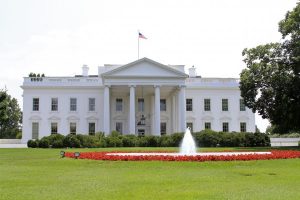Kudos to Nancy Gibbs, reporter Michael Scherer and Time magazine for their superb treatment of President Donald Trump’s disturbing relationship with the truth and what that means for our nation. Gibbs in her “From the Editor” piece was clear and forthright: “Trump says a great many things that are demonstrably false.” She reminds us that “70% of the Trump statements [in the 2016 campaign] reviewed by PolitiFact were false” and “nearly two-thirds [of voters] said that Trump was not trustworthy” (even though many still voted for him). Gibbs argues that Trump as President speaks for the country – and we must be able to trust our President. But in his case, we cannot.
The accompanying Time article, “Is Truth Dead?” by Scherer, described again for us the many statements Trump has made as President that are demonstrably false. Scherer noted that Trump uses several strategies when telling these lies, such as claiming something that was false at the time but for which he later found evidence and for attributing provocative beliefs to unnamed others. Trump has praised “truthful hyperbole” in his business dealings and has been using these tactics for his entire career, making him a “veteran and strategic misleader” who always leaves himself an “escape route.” Scherer lays out in detail the many reasons that Trump’s new way of behaving as President puts our nation at great risk.
Of course Trump supporters and the White House will consider these perspectives “fake news” or the like. We cannot, however, be swayed by their “spin;” we must look at all the evidence that has been amassed since Trump launched his campaign, discern it with clear eyes, and act accordingly as responsible citizens.
It is probably the case that most of our Presidents have had to shade the truth to the public at times, for reasons such as national security, protecting sources and the like. Politics, especially at the national level, is highly complex; we would all like as much transparency and truthfulness as possible, but it is sometimes forgivable for a President or his/her spokespeople to provide misinformation if there is a strong, ethical reason. And of course we should call out any leader who betrays the truth, especially for political expediency or that puts us at risk. Among the reasons that Trump’s lies and distortions are so problematic and disturbing, though, are that they are so frequent, so obvious, so petty, so gratuitous and unnecessary at times, and so potentially dangerous. In other contexts – the workplace, for instance – pathological lying like this would be grounds for dismissal.
If I can put aside for a moment my distaste and contempt for Trump – my shame and embarrassment that he is the leader of my nation – I feel profoundly sorry for him. In the best of the Christian tradition (and other religious systems), he is a human being, a “child of God,” and I have vowed many times in the baptismal covenant to “respect the dignity of every human being.” At one time almost 70 years ago, Trump was a baby or child who craved love, tenderness, and acceptance. We were all in that same situation in our own lives; there is a kernel of decency in all of us when we begin our lives.
For most of us, as we grow and mature, that original craving for love turns into tenderness, acceptance and empathy toward others. (This doesn’t mean that we’re wonderful toward everyone all the time, but most of us are fairly ethical and decent toward others; otherwise we would find ourselves in a much nastier society!) Most of us have developed a conscience, and that “inner cop” guides most of our decisions and actions. I would like to think that Trump perhaps has this kernel in some part of his life; there is evidence that he does have true love and affection for his children and grandchildren, for instance.
The personality evidence over time shows, however, that Trump never seems to have fully developed a conscience and that he demonstrates a high level of callousness and lack of empathy. The reason I pity Trump is that his personality disorder causes him to constantly need enemies, to be incapable of apologizing or admitting that he has been wrong, and to be all-consumed by anger; in many ways, that must be hell.
The paranormal evidence here becomes relevant: the law of cause and effect, or karma, is the law of the universe, and we are all subject to it. At some point in our eternal existence, we will have to answer – and pay – for all the ways we have harmed others. There is no automatic erasing of aberrant behavior. Trump is not exempt from this reality, and there is no way around it.
 In the words of postmortem Arthur Conan Doyle, a departed soul who has “lived a life gross, material, sensual, or selfish, finds himself in “queer street” [in trouble]. . . . He passes onward, through the underworlds. Every step towards salvation must be earned.”
In the words of postmortem Arthur Conan Doyle, a departed soul who has “lived a life gross, material, sensual, or selfish, finds himself in “queer street” [in trouble]. . . . He passes onward, through the underworlds. Every step towards salvation must be earned.”
Doyle describes these “underworlds” and the reason for them:
“[W]hat of those [places] of a slower, of a lower vibration; perhaps even lower than this earth? These are not pleasant places, for they are peopled by humans whose lives have attuned them to such planes. They are grey, misty, dark-November-fog places, good to get out of. That is why they exist; to spur their folk to get away, by their own spiritual efforts.”
It is not for me or anyone else to completely judge Donald Trump, but his long-time public behavior and what we know about people he has harmed strongly suggest that his soul might well be “in queer street.” One of the primary reasons that Roman Catholics pray for souls in Purgatory (a “place” for which, however, there is little evidence in the paranormal literature) is that such prayer can be beneficial to such a “lost” soul. (There is evidence, though, that prayers do help souls in their spiritual journeys.)
In my church, we pray for our President (whoever that may be) at every Sunday service and in daily prayers. It is hard for many of us to pray for Trump – perhaps mainly because it is hard for us to acknowledge him as our President… But pray we must – for his spiritual growth and for the sake of our beloved nation.
 Whatever the state of Trump’s soul, which is ultimately up to him, the larger issue affects us all. We cannot allow truth to die in our public discourse. As Scherer reminds us, “democracy needs facts to allow for public debate and provide a check on abuses of power.” Truth is hated by tyrants, as pointed out long ago by renowned philosopher Hannah Arendt: they “rightly fear the competition of a coercive force they cannot monopolize.” If Trump is a tyrant or fast becoming one, he cannot long function as such in the White House. It is up to us citizens either to find ways to curtail his destructive actions (which seems hardly likely at this point) or to lawfully take away his privilege of being President.
Whatever the state of Trump’s soul, which is ultimately up to him, the larger issue affects us all. We cannot allow truth to die in our public discourse. As Scherer reminds us, “democracy needs facts to allow for public debate and provide a check on abuses of power.” Truth is hated by tyrants, as pointed out long ago by renowned philosopher Hannah Arendt: they “rightly fear the competition of a coercive force they cannot monopolize.” If Trump is a tyrant or fast becoming one, he cannot long function as such in the White House. It is up to us citizens either to find ways to curtail his destructive actions (which seems hardly likely at this point) or to lawfully take away his privilege of being President.
Resources
 Abrahamsen, Valerie A. Paranormal: A New Testament Scholar Looks at the Afterlife. Manchester Center, Vermont: Shires Press, 2015.
Abrahamsen, Valerie A. Paranormal: A New Testament Scholar Looks at the Afterlife. Manchester Center, Vermont: Shires Press, 2015.
Cooke, Ivan. Arthur Conan Doyle’s Book of the Beyond. New Lands, England: The White Eagle Publishing Trust, 2006. See especially pages 110, 163.
Scherer, Michael. “Is Truth Dead?” Time, Vol. 189, No. 12 (April 3, 2017) 32-39.
